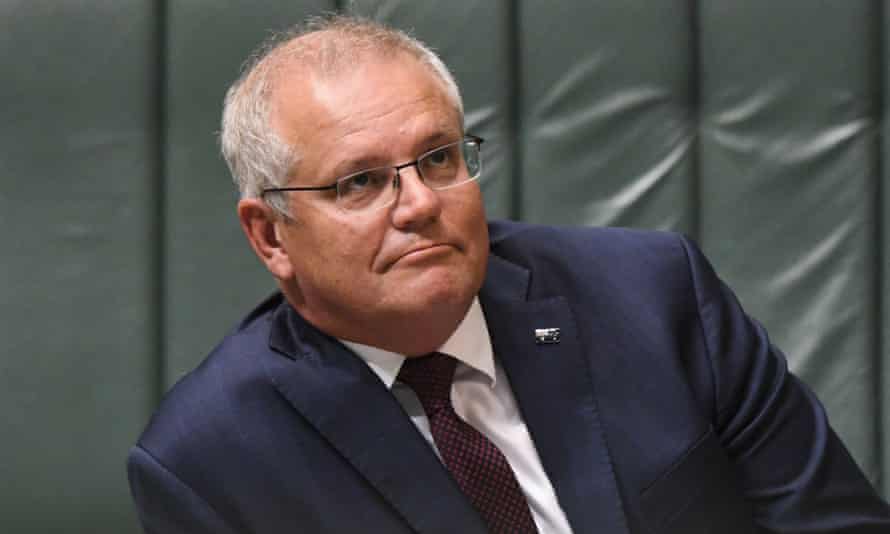Extract from The Guardian
Exclusive: independent office unable to find one instance when Julia Gillard as leader referred a question to a colleague

Last modified on Sun 14 Feb 2021 06.02 AEDT
Scott Morrison has avoided answering parliamentary questions by referring them to ministerial colleagues 189 times since becoming prime minister, new analysis reveals.
The analysis, undertaken by the parliament’s independent procedure office in response to a request from Labor, indicates there have been a further 62 times when Morrison answered a question in part before asking another minister to add to the answer.
By contrast, the procedure office reported that it could not find any similar cases when Julia Gillard was prime minister from 2010 to 2013.
The analysis has been shared with Guardian Australia on the eve of the resumption of parliament.
The manager of opposition business, Tony Burke, seized on the figures, saying they confirmed Morrison’s aversion to scrutiny and accountability.
“He doesn’t answer journalists’ questions in press conferences, and he won’t answer our questions in parliament,” Burke said.
“Mr Morrison is always there to take credit for good news, even when he’s had nothing to do with it. But when the questions get tough, he hides behind his ministers.”
Daily question time, which begins at 2pm when parliament is sitting, is the central forum for the political contest between the opposition and the government.
Answers must be directly relevant to the question – but there is no rule against the prime minister handing over to a ministerial colleague for a response.
Burke’s office had asked the procedure office to review Hansard for occasions where questions without notice directed to the prime minister were referred in part or in full to another minister for a reply.
In response, the procedure office explained that researchers had looked at questions to Morrison between August 2018, when he took office, and last week. For comparison purposes, the procedure office also agreed with Labor’s request to look at records for Gillard’s prime ministership.
It is understood it was considered too labour-intensive to go through the Hansard for all recent prime ministers, but Gillard was selected as a comparison because she had served a similar length of time in the top job as Morrison.
“We found 189 occasions where prime minister Morrison referred a question to another minister in full and 62 occasions where he answered a question in part before asking another minister to add to his answer,” the procedure office said in its response to Labor.
“We did not find any occasion where prime minister Gillard referred a question to another minister.”
The procedure office told Labor it had not counted out-of-order questions, supplementary questions, additional answers or questions directed to an acting prime minister.
Burke said Malcolm Turnbull and Tony Abbott “didn’t hide from questions, and Julia Gillard never hid from a tough question in parliament – not once, as this research confirms”.
Burke’s comments reflect a broader Labor push to muscle up to Morrison ahead of the next federal election, which could be held in the second half of this year or the first half of next year.
Over the summer recess, Labor also reached out to local media outlets in an attempt to apply public pressure to Coalition MPs in marginal seats for the number of times they have voted to shut down debate.
The attorney general and leader of the House of Representatives, Christian Porter, has previously defended the government’s parliamentary tactics.
“The government has focused over the past year on ensuring the passage of critical pieces of legislation to help Australians deal with the economic and health impacts of Covid-19,” Porter said.
In response to earlier questions about the government moving gag motions, Porter said Burke and the Labor party were just focused on themselves and that they made “constant efforts to disrupt the program pointlessly”.
Amid grumbling from some in Labor ranks about Anthony Albanese’s performance, the opposition leader moved last month to reshuffle his shadow ministry, arguing the changes were needed to “maximise our potential to win the next election”.
Parliament is set to resume for a two-week sitting from Monday, with the political contest expected to be dominated by the government and the opposition’s rival industrial relations policies.
The government is set to face questions about the scheduled end of the jobkeeper wage subsidy and uncertainty over the rate of the jobseeker allowance from next month, with Victoria’s snap five-day lockdown serving as a fresh reminder the Covid-19 crisis is not over.
At midday on Monday, the lower house will hear speeches marking the 13th anniversary of Kevin Rudd’s national apology to the Stolen Generations.
This week MPs are also set to debate government bills for an energy grid reliability fund and to promote free speech on university campuses.
No comments:
Post a Comment